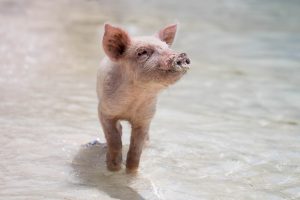Animal Wellness Action urges State Attorney General to advocate for no exemptions on sale of factory-farmed pork.
Boston—In an ongoing legal battle over the implementation of Question 3 in Massachusetts, a federal judge who had upheld nearly all key provisions of the 2016 voter-approved law struck down this week a very narrow provision included in the Act. Experts say the judge’s act may in the end result in better, more consistent enforcement of the law.
“Consumers in Massachusetts can feel assured that the core provisions of Question 3 are intact and that the law’s provisions are in effect to require supermarkets, restaurants, and other food retailers to sell only pork from farms that do not rely on crates so small and restrictive that breeding sows are immobilized,” said Wayne Pacelle, president of Animal Wellness Action and a key architect of Question 3. “We encourage all food retailers to adhere to the letter and spirit of the law and to urge the Attorney General to enforce its provisions without fear or favor.”
Voters gave the measure—which forbids gestation crates for sows, battery cages for hens, and small crates for veal calves—majorities in a stunning 348 of 351 towns in the Commonwealth and an extraordinary 78 percent supermajority statewide. Question 3 requires that breeding sows, laying hens, and veal calves have sufficient space to move and also that all pork, eggs, and veal sold in the state come from compliant farms, no matter where the animals are reared.
In May 2023, the Supreme Court of the United States upheld a nearly identical measure, California Proposition 12, as constitutional and a proper exercise of state authority. Prop 12 was modeled after Question 3, so the high court’s ruling in NPPC v. Ross left Question 3 intact as well.
Despite the dispositive action in NPPC v. Ross, the factory farming lobby continues with desperate courtroom maneuverings to strike to weaken Question 3 and deny Commonwealth consumers to block the application of humane housing and sales standards relating to farm animal treatment.
In the wake of the Supreme Court ruling, a federal judge in Boston upheld as constitutional all provisions in Question 3 that restrict food retailers—whether supermarkets, restaurants, food trucks, or the like—from selling whole cuts of pork that come from factory farms that severely confine the sows. Those core elements of the law have been in effect since August 2023, and the restriction on the sale of eggs from caged hens has been in place months prior to that.
The continuing legal kerfuffle relates to a narrow provision challenged by Triumph Food, a Missouri-based factory farming company seeking relief to sell confinement pork in the state to some end users, such as hospitals, prisons, and other institutional food purchasers. In its latest decision, the court granted the plaintiffs a technical win on that narrow point, reasoning that the Act’s “slaughterhouse exemption,” which allowed the instate sale of noncompliant pork to end users like school districts and prison systems, discriminated against pork producers that did not maintain slaughterhouses in the state.
But in striking down that provision, the court may be correcting an inconsistency it identified in the law, eliminating the “slaughterhouse exemption” and forbidding any party—whether an in-state slaughterhouse or an out-of-state producer—from selling confinement pork to an end user like a prison or a hospital.
The court has granted parties in the case additional time to brief the argument that Question 3 may be susceptible to a further preemption claim under the Federal Meat Inspection Act
“The state’s reaction to this recent ruling and its handling of the next phase of this case is critical for the future of Question 3,” Pacelle said. “The court’s ruling should make it plain that no slaughterhouse or processor—whether located in Massachusetts or not—can now supply non-compliant pork to anyone in the Commonwealth. The state must also vigorously defend that position and oppose any additional attempts by Triumph Food and the pork industry to further undermine Question 3.”

Many major U.S. companies and restaurants, including McDonald’s and Costco, have already promised their consumers that they will forbid in relatively short order sourcing pork or eggs from operations that confine the sows or hens in extreme ways. The Supreme Court ruling upheld Prop 12, Question 3, and other similarly constructed state laws, and it is time for the pork industry to comply with these legal and corporate standards and stop trying to produce a product that comes from a fundamentally inhumane production practice.
ABOUT
Animal Wellness Action is a Washington, D.C.-based 501(c)(4) whose mission is to help animals by promoting laws and regulations at federal, state and local levels that forbid cruelty to all animals. The group also works to enforce existing anti-cruelty and wildlife protection laws. Animal Wellness Action believes helping animals helps us all. X: @AWAction_News
The Center for a Humane Economy is a Washington, D.C.-based 501(c)(3) whose mission is to help animals by helping forge a more humane economic order. The first organization of its kind in the animal protection movement, the Center encourages businesses to honor their social responsibilities in a culture where consumers, investors, and other key stakeholders abhor cruelty and the degradation of the environment and embrace innovation as a means of eliminating both. The Center believes helping animals helps us all. X: @TheHumaneCenter


Join the conversation!